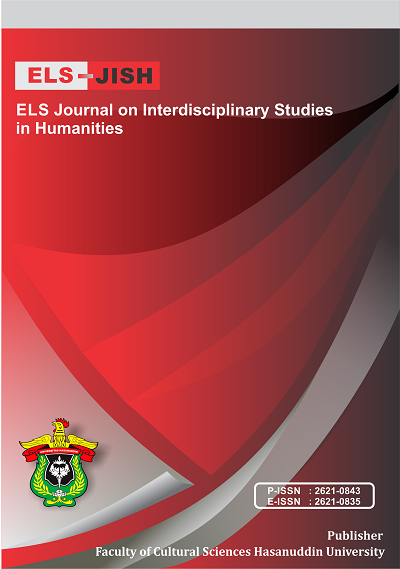The EFL Students’ Perception of the Online Learning during Covid-19 Pandemic and New Normal Era
DOI:
https://doi.org/10.34050/elsjish.v6i3.30864Keywords:
Expectation, Improvement, Online Learning, Pandemic EraAbstract
This research aimed to investigate the EFL students’ perception and expectation of the online learning of the online learning during Covid-19 pandemic and new normal era. This research applied quantitative and qualitative descriptive with survey method. The participants were the English education study program students consisting of fifteen participants at Universitas Muhammadiyah Parepare. In this research, the researchers conducted interview and questionnaire to obtain the data. The result of this research showed that online method was the best solution to be applied change the offline class based on the condition nowadays, but still ineffective in the application. Another result showed that in the implementation of online learning during this pandemic era there was some obstacles found and need more improvement to make learning process more effective. In brief, online learning is relatively good with several obstacles that require improvement. Thus, it is recommended to create a good learning platform that can be applicable in current situation. So that, it is recommended that online learning should be planned, implemented, and evaluated to minimize problems and maximize the achievement of learning objectives.
References
Adnan, M., & Anwar, K. (2020). Online Learning amid the COVID-19 Pandemic: Students' Perspectives. Online Submission, 2(1), 45-51.
Akbulut, M., Sahin, U., & Esen, A. C. (2020). More than a Virus: How COVID 19 Infected Education in Turkey?. Journal of Social Science Education, 19, 30-42.
Anggawirya, A. M., Prihandoko, L. A., & Rahman, F. (2021, December). Teacher’s Role on Teaching English during Pandemic in a Blended Classroom. In International Joined Conference on Social Science (ICSS 2021) (pp. 458-463). Atlantis Press.
Aswad, M., Rahman, F., Said, I. M., Hamuddin, B., & Nurchalis, N. F. (2019). A software to increase English learning outcomes: An acceleration model of English as the second language. The Asian EFL Journal, 26(6.2), 157.
Bahasoan, A. N., Ayuandiani, W., Mukhram, M., & Rahmat, A. (2020). Effectiveness of online learning in pandemic COVID-19. International journal of science, technology & management, 1(2), 100-106.
Bawawa, M., Leba, S. M. R., & Uspayanti, R. (2021). Teaching method used by english teachers during Covid-19 pandemic and new normal era. Ethical Lingua: Journal of Language Teaching and Literature, 8(2), 384-389.
Azhari, B., & Fajri, I. (2022). Distance learning during the COVID-19 pandemic: School closure in Indonesia. International Journal of Mathematical Education in Science and Technology, 53(7), 1934-1954.
Churiyah, M., Sholikhan, S., Filianti, F., & Sakdiyyah, D. A. (2020). Indonesia education readiness conducting distance learning in Covid-19 pandemic situation. International Journal of Multicultural and Multireligious Understanding, 7(6), 491-507.
Cooke, G. S., Andrieux-Meyer, I., Applegate, T. L., Atun, R., Burry, J. R., Cheinquer, H., ... & Yau, J. (2019). Accelerating the elimination of viral hepatitis: a Lancet Gastroenterology & Hepatology Commission. The lancet Gastroenterology & hepatology, 4(2), 135-184.
Creswell, J. W. (1999). Mixed-method research: Introduction and application. In Handbook of educational policy (pp. 455-472). Academic press.
Djalante, R., Lassa, J., Setiamarga, D., Sudjatma, A., Indrawan, M., Haryanto, B., ... & Warsilah, H. (2020). Review and analysis of current responses to COVID-19 in Indonesia: Period of January to March 2020. Progress in disaster science, 6, 100091.
Ezzatpanah, H., Gómez‐López, V. M., Koutchma, T., Lavafpour, F., Moerman, F., Mohammadi, M., & Raheem, D. (2022). Risks and new challenges in the food chain: Viral contamination and decontamination from a global perspective, guidelines, and cleaning. Comprehensive Reviews in Food Science and Food Safety, 21(2), 868-903.
Hanafi, Y., Taufiq, A., Saefi, M., Ikhsan, M. A., Diyana, T. N., Thoriquttyas, T., & Anam, F. K. (2021). The new identity of Indonesian Islamic boarding schools in the “new normal”: the education leadership response to COVID-19. Heliyon, 7(3).
Khaerana, A. S. A., Soraya, A. I., & Latief, M. R. A. (2022). Receptive and productive skills online learning during covid-19 pandemic. International Journal of Innovative Science and Research Technology, 7(1), 1-6.
Likert, R. (1932). A technique for the measurement of attitudes. Archives of psychology.
Minhaji, M., Nawafil, M., & Muqit, A. (2022). Implementation of the Islamic Religious Education Learning Methods Innovation in the New Normal Era. Al-Ishlah: Jurnal Pendidikan, 14(2), 2107-2118.
Rahman, F., Abbas, A., Hasyim, M., Rahman, F., Abbas, A., & Hasyim, M. (2019). Facebook group as media of learning writing in ESP context: A case study at Hasanuddin University. Asian EFL Journal Research Articles, 26(6.1), 153-167.
Rapanta, C., Botturi, L., Goodyear, P., Guàrdia, L., & Koole, M. (2020). Online university teaching during and after the Covid-19 crisis: Refocusing teacher presence and learning activity. Postdigital science and education, 2, 923-945.
Sukmawaty, Rahman, F. F., & Andini, C. (2022). Covid-19 Pandemic and Axiology of Communication: A Study of Linguistic Phenomena. IJISRT, 7(4), 1079-1087.
Tight, M. (2016). Phenomenography: The development and application of an innovative research design in higher education research. International Journal of Social Research Methodology, 19(3), 319-338.
Downloads
Published
How to Cite
Issue
Section
License
Copyright (c) 2023 Khadijah Maming, Widya Rizky Pratiwi, Ali Wira Rahman, Muh. Bustamin Khaldun

This work is licensed under a Creative Commons Attribution-ShareAlike 4.0 International License.






